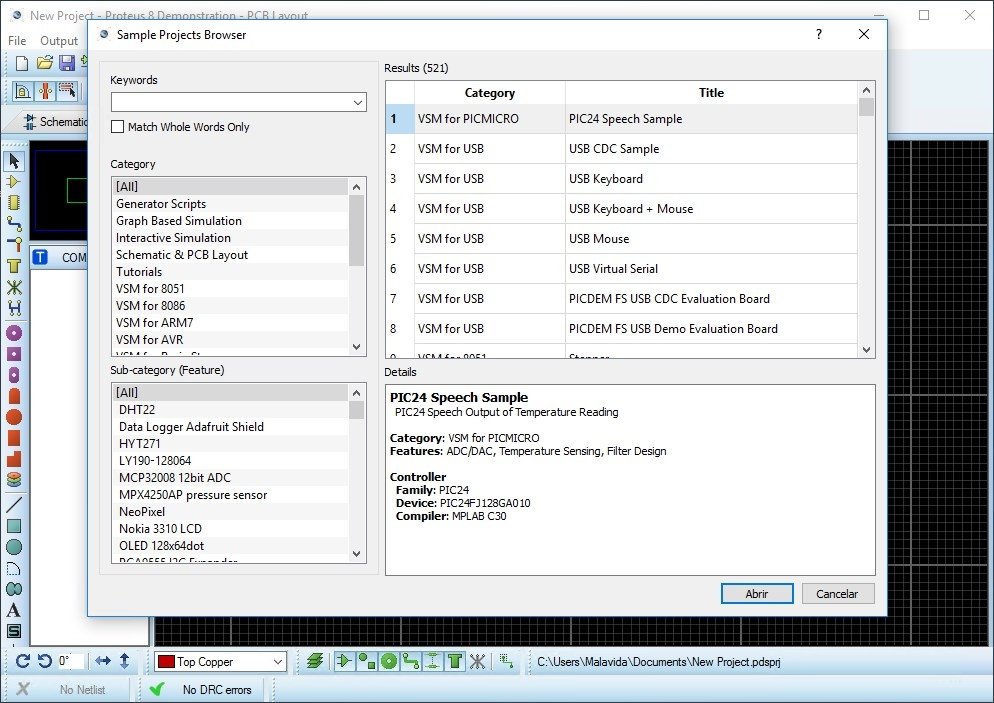Proteus 8 Language Pack

Publisher Description Proteus is a Virtual System Modelling and circuit simulation application. The suite combines mixed mode SPICE circuit simulation, animated components and microprocessor models to facilitate co-simulation of complete microcontroller based designs. Proteus also has the ability to simulate the interaction between software running on a microcontroller and any analog or digital electronics connected to it. It simulates Input / Output ports, interrupts, timers, USARTs and all other peripherals present on each supported processor. Aqw legion token bot. This is not the full Proteus software, it is a demo version. The Limitations of the demonstration version are as follows: - You cannot print any Schematics, Bill of Materials or Layouts.
- You cannot save your work. - You cannot simulate your own microcontroller designs. You can however write your own software programs to run on the existing sample design suite for evaluation purposes. It is not time limited!
Proteus ( PROcessor for TExt Easy to USe) is a fully functional, procedural programming language created in 1998 by Simone Zanella. Proteus incorporates many functions derived from several other languages:,,, /dBase; it is especially versatile in dealing with strings, having hundreds of dedicated functions; this makes it one of the richest languages for text manipulation. Proteus owes its name to a Greek god of the sea (), who took care of Neptune's crowd and gave responses; he was renowned for being able to transform himself, assuming different shapes. Transforming data from one form to another is the main usage of this language. Contents • • • • • • • Introduction [ ] Proteus was initially created as a multiplatform (,, ) system utility, to manipulate text and binary files and to create scripts. The language was later focused on Windows, by adding hundreds of specialized functions for: network and serial communication, database interrogation, system service creation, console applications, keyboard emulation, scripting (for ).
About: Electronicslovers started in July 2011 with the mission to produce ideas to student and engineer or hobbyist to learn electronics practically. Proteus - Proteus is a great electrical suite for circuit simulation purposes. YASP (Yet Another Simple Processor) is a 8-bit microprocessor with microcontroller.
Most of these additional functions are only available in the Windows flavour of the interpreter, even though a version is still available. Proteus was designed to be practical (easy to use, efficient, complete), readable and consistent. Its strongest points are: • powerful string manipulation; • comprehensibility of Proteus scripts; • availability of advanced data structures:, (single or double),,,,. The language can be extended by adding user functions written in Proteus or created in C/. Language features [ ] At first sight, Proteus may appear similar to Basic because of its straight syntax, but similarities are limited to the surface: • Proteus has a fully functional, procedural approach; • variables are untyped, do not need to be declared, can be local or public and can be passed by value or by reference; • all the typical control structures are available (if-then-else; for-next; while-loop; repeat-until; switch-case); • new functions can be defined and used as native functions.
Data types supported by Proteus are only three: integer numbers, floating point numbers and strings. Access to advanced data structures (files, arrays, queues, stacks, AVL trees, sets and so on) takes place by using handles, i.e. Integer numbers returned by item creation functions. Type declaration is unnecessary: variable type is determined by the function applied – Proteus converts on the fly every variable when needed and holds previous data renderings, to avoid performance degradation caused by repeated conversions. There is no need to add parenthesis in expressions to determine the evaluation order, because the language is fully functional (there are no operators). Proteus includes hundreds of functions for: • accessing file system; • sorting data; • manipulating dates and strings; • interacting with the user (console functions) • calculating logical and mathematical expressions. Proteus supports associative arrays (called sets) and AVL trees, which are very useful and powerful to quickly sort and lookup values.